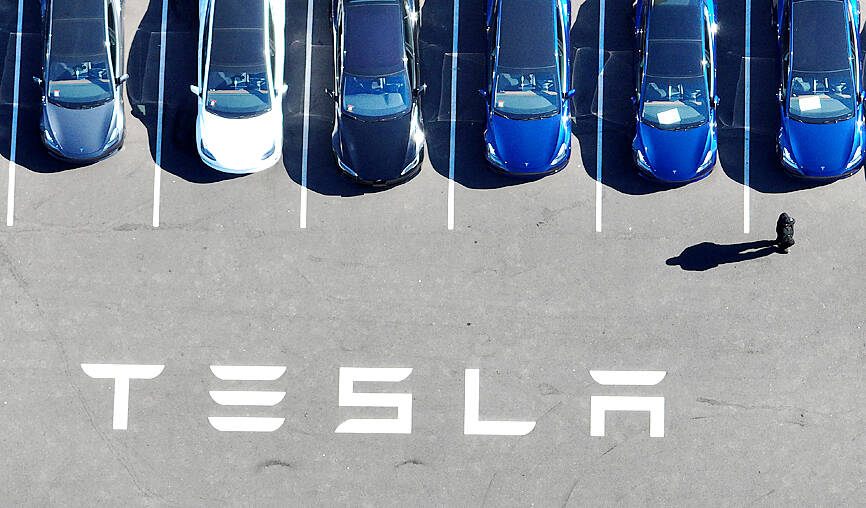Tesla Inc is recalling almost 81,000 electric vehicles (EVs) in China — more than it typically ships from its Shanghai factory in any given month — due to a software issue and seat belt problems.
The US EV maker would call back 70,434 imported Model S, Model X and Model 3 vehicles, and 10,127 China-made Model 3 vehicles, the Chinese State Administration for Market Regulation said in a statement yesterday.
The Model S and Model X recalls require an over-the-air software fix to address a defect in the vehicles’ battery management system, which could lead to a loss of power, while the Model 3s have a faulty seat belt fixture.

Photo: AFP
Tesla called for any impacted Model 3 owners to return their cars for a checkup and maintenance if needed, while urging drivers to be “cautious” on the road.
The US electric vehicle maker is going through a rocky patch in China, the world’s biggest automotive market, with deliveries last month falling to 71,704 from a record high of 83,135 in September, underscoring the automaker’s recent price cut to boost demand.
Tesla is changing its marketing approach in China, as fierce competition from domestic rivals such as BYD Co (比亞迪) and uneven sales put its growth plans in what is also the world’s largest EV market at risk.
Although Tesla recently upgraded its Shanghai factory to double capacity to about 1 million cars a year, wait times for cars have shrunk to as little as one week from 22 weeks earlier this year, a sign the company is struggling to boost sales to meet those ambitions.
The company is suffering from other controversies over product safety in China following a recent accident in the southeast of the country that killed two people.
Tesla earlier this month said it would assist a police investigation into the fatal crash involving the Model Y sports utility, but said that data taken from the car showed no proof the brake pedal had been applied.
The driver and his family insisted that the accident must have been caused by a technical problem.
The public was reminded of a protest last year in which a Model 3 owner climbed atop a display vehicle at the Shanghai auto show and yelled that she almost died because her Tesla’s brakes failed.
Tesla, which initially enjoyed a red carpet welcome in China, made a public apology after facing criticism from local authorities and state-run media, without acknowledging any defect to the car.
Yesterday’s recall is not the first for Tesla in China, although its scale is smaller than prior ones.
In June last year, Tesla had to make a software fix to more than 285,000 vehicles, or most of the vehicles it had delivered there in recent years, to address a safety issue identified by the country’s regulator.
China is Tesla’s most important market after the US.
The Model Ys and Model 3s made at its factory on the outskirts of Shanghai supply the local market, and are also exported to other parts of Asia and Europe.

PATENTS: MediaTek Inc said it would not comment on ongoing legal cases, but does not expect the legal action by Huawei to affect its business operations Smartphone integrated chips designer MediaTek Inc (聯發科) on Friday said that a lawsuit filed by Chinese smartphone brand Huawei Technologies Co (華為) over alleged patent infringements would have little impact on its operations. In an announcement posted on the Taiwan Stock Exchange, MediaTek said that it would not comment on an ongoing legal case. However, the company said that Huawei’s legal action would have little impact on its operations. MediaTek’s statement came after China-based PRIP Research said on Thursday that Huawei filed a lawsuit with a Chinese district court claiming that MediaTek infringed on its patents. The infringement mentioned in the lawsuit likely involved

Taipei is today suspending work, classes and its US$2.4 trillion stock market as Typhoon Gaemi approaches Taiwan with strong winds and heavy rain. The nation is not conducting securities, currency or fixed income trading, statements from its stock and currency exchanges said. Authorities had yesterday issued a warning that the storm could affect people on land and canceled some ship crossings and domestic flights. Taiwan Semiconductor Manufacturing Co (TSMC, 台積電) expects its local chipmaking fabs to maintain normal production, the company said in an e-mailed statement. The main chipmaker for Apple Inc and Nvidia Corp said it has activated routine typhoon alert

GROWTH: TSMC increased its projected revenue growth for this year to more than 25 percent, citing stronger-than-expected demand for AI devices and smartphones The Taiwan Institute of Economic Research (TIER, 台灣經濟研究院) yesterday raised its forecast for Taiwan’s GDP growth this year from 3.29 percent to 3.85 percent, as exports and private investment recovered faster than it predicted three months ago. The Taipei-based think tank also expects that Taiwan would see a 8.19 percent increase in exports this year, better than the 7.55 percent it projected in April, as US technology giants spent more money on artificial intelligence (AI) infrastructure and development. “There will be more AI servers going forward, but it remains to be seen if the momentum would extend to personal computers, smartphones and

Catastrophic computer outages caused by a software update from one company have once again exposed the dangers of global technological dependence on a handful of players, experts said on Friday. A flawed update sent out by the little-known security firm CrowdStrike Holdings Inc brought airlines, TV stations and myriad other aspects of daily life to a standstill. The outages affected companies or individuals that use CrowdStrike on the Microsoft Inc’s Windows platform. When they applied the update, the incompatible software crashed computers into a frozen state known as the “blue screen of death.” “Today CrowdStrike has become a household name, but not in